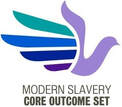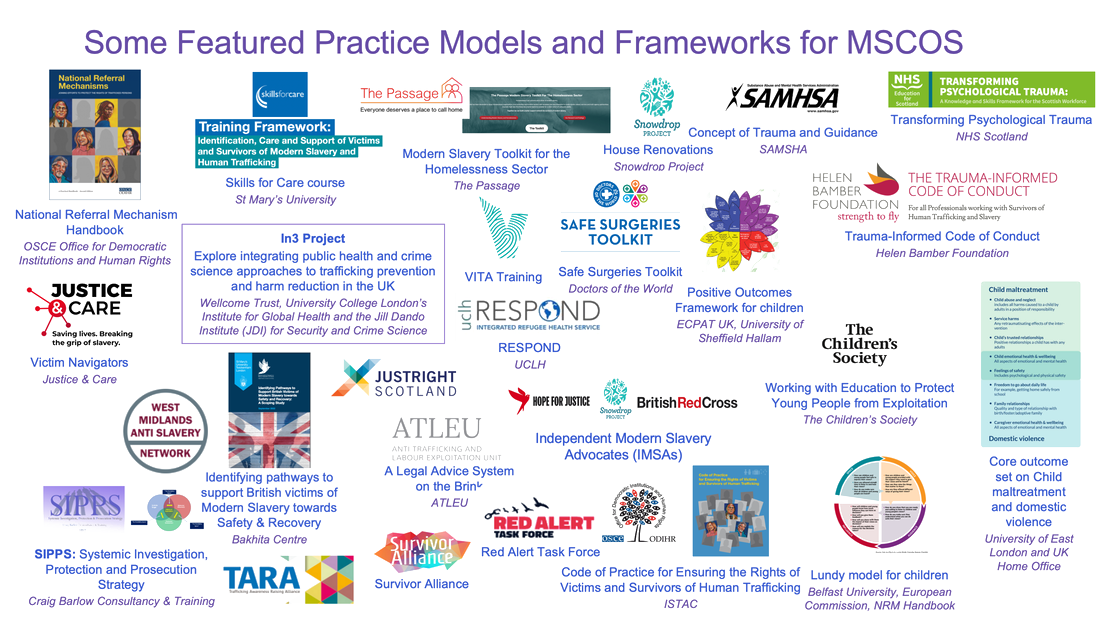Welcome to the Modern Slavery Core Outcome Set (MSCOS) Community of Practice
We are creating a community of survivors, professionals and other experts who work in practice with survivors of human trafficking / modern slavery across all related fields, sectors and services. You can read more about the Community here. At the centre of our community is the MSCOS Research Advisory Board of experts by lived experience who speak, guide and participate in this project at every level. Our aim is to embed the MSCOS model in all forms of practice and services for survivors, and to reach further understanding on the development of measurable standards for core outcomes which are practical and easily adaptable across the various disciplines.
There is so much excellent work on practice models and resources that is already out there, but it needs to be shared (rather than siloed) across professional fields. Together we can explore where there is shared understanding, where there are differing challenges – and how, collaboratively, we can overcome these.
Why do we need MSCOS?
Human trafficking is such a serious crime that many people presume that victims would be provided, at minimum, with the 7 core outcomes of the MSCOS. The core outcomes are quite obviously fundamental to the needs of any person who has suffered prolonged and repeated psychological, and often physical violence and subjugation in modern slavery. However, the reality is that most survivors face a whole new set of serious difficulties from the point of their escape, which mean that they do not have the basic things they so desperately need. There are often multiple, insurmountable challenges to face, which have a long term impact on their lives and the lives of their children.
Claims made by Governments and various agencies and organisations about responses to survivors can be seriously misleading: we hear from survivors that in reality the 7 core outcomes are not achieved at all, or if they are achieved to any extent, delivery is often insufficient, inconsistent, or not for long enough to support and sustain their recovery, well-being and integration. Unfortunately, delivery of protection, provision and services can be be sporadic and uneven, with different outcomes being achieved at different times. The quality of outcomes varies widely: front-line professionals and survivors describe circumstances for people who have been trafficked that are dangerous, due to protection and provision being inadequate.
Therefore, 7 core outcomes need to be delivered simultaneously, as a set: as our Research Advisory Board member, Keith Lewis puts it: "The MSCOS is like the tower in a Jenga game: If you remove one outcome - one ‘block’, - the tower becomes unstable; remove another block and the tower can crash down; the survivor is failed, they can’t recover, and the chances are they will suffer more exploitation and human trafficking."
There is so much excellent work on practice models and resources that is already out there, but it needs to be shared (rather than siloed) across professional fields. Together we can explore where there is shared understanding, where there are differing challenges – and how, collaboratively, we can overcome these.
Why do we need MSCOS?
Human trafficking is such a serious crime that many people presume that victims would be provided, at minimum, with the 7 core outcomes of the MSCOS. The core outcomes are quite obviously fundamental to the needs of any person who has suffered prolonged and repeated psychological, and often physical violence and subjugation in modern slavery. However, the reality is that most survivors face a whole new set of serious difficulties from the point of their escape, which mean that they do not have the basic things they so desperately need. There are often multiple, insurmountable challenges to face, which have a long term impact on their lives and the lives of their children.
Claims made by Governments and various agencies and organisations about responses to survivors can be seriously misleading: we hear from survivors that in reality the 7 core outcomes are not achieved at all, or if they are achieved to any extent, delivery is often insufficient, inconsistent, or not for long enough to support and sustain their recovery, well-being and integration. Unfortunately, delivery of protection, provision and services can be be sporadic and uneven, with different outcomes being achieved at different times. The quality of outcomes varies widely: front-line professionals and survivors describe circumstances for people who have been trafficked that are dangerous, due to protection and provision being inadequate.
Therefore, 7 core outcomes need to be delivered simultaneously, as a set: as our Research Advisory Board member, Keith Lewis puts it: "The MSCOS is like the tower in a Jenga game: If you remove one outcome - one ‘block’, - the tower becomes unstable; remove another block and the tower can crash down; the survivor is failed, they can’t recover, and the chances are they will suffer more exploitation and human trafficking."
As a sector, we do not have big funding for promotional campaigns and we often struggle to compete with constant, worrying developments in the field of anti-trafficking. However, collectively we have a stronger voice, and a great deal of knowledge to share. Together, we can make change.
Rachel Witkin, MSCOS Community of Practice Director, (Contact: [email protected])
&
Arnas Tamasauskas, MSCOS Community of Practice Facilitator (Contact: [email protected])
Rachel Witkin, MSCOS Community of Practice Director, (Contact: [email protected])
&
Arnas Tamasauskas, MSCOS Community of Practice Facilitator (Contact: [email protected])















